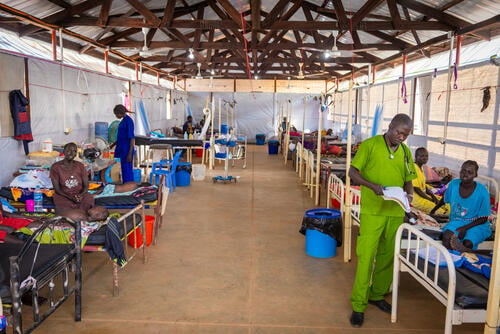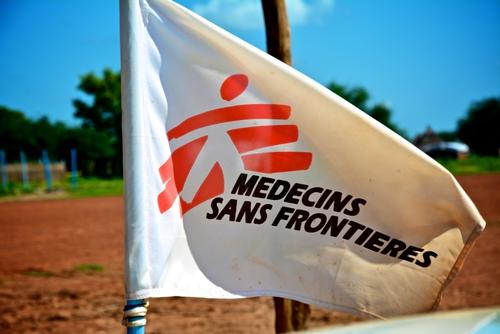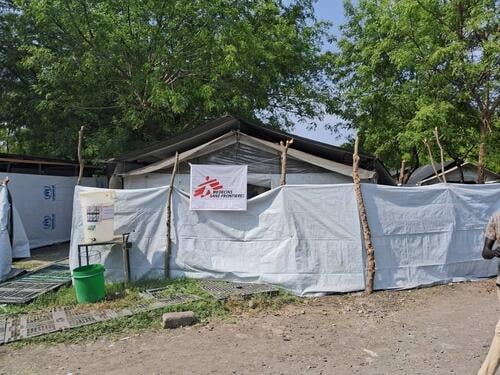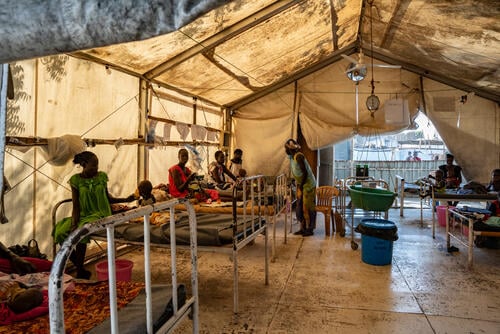Nairobi– An alarming number of children suffering from severe malaria have been admitted to Aweil state hospital, where Médecins Sans Frontières (MSF) runs the paediatric and maternity wards, in Northern Bahr El-Ghazal state, South Sudan, over the past three months. Malaria admissions to the children’s ward began to increase in June and, by September, up to 400 children a week were being admitted to the paediatric department with severe malaria – more than double the numbers compared to September the previous year. This is cause for serious concern.
“Every year, there is a surge in malaria cases during the rainy season in Aweil and we conduct seasonal preventative activities for tens of thousands of children,” says Mamman Mustapha, MSF’s Head of Mission in South Sudan. “We open test and treatment centres so that people can quickly be diagnosed and receive treatment, and we establish a ‘malaria ward’ inside the hospital with 72 beds. However, this year we have faced an exceptional situation and the hospital has been completely overwhelmed.”
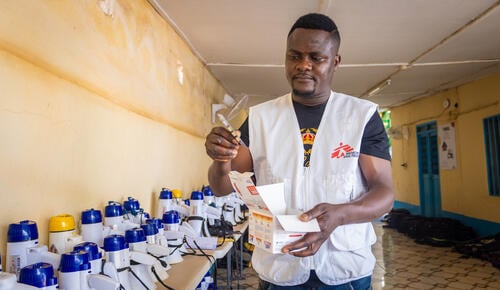
“Even though we increased the number of beds in the malaria ward to 94 in September, it was not enough to cope with the surge in admissions, and many patients were still being treated in the corridors,” says Mustapha. “Over the past month alone, we have admitted an average of 43 children suffering from severe forms of malaria each day, with many requiring blood transfusions. Since September, we’ve carried out an average of 14 blood transfusions for malaria each day, and at any one time, there have been an average of 140 children admitted in the hospital suffering from severe malaria.
“These are terrible statistics. It should not be the case that so many children are ending up in hospital with advanced forms of malaria when it can so easily be treated at a health clinic,” says Mustapha.
This year we have faced an exceptional situation and the hospital has been completely overwhelmed.Mamman Mustapha, MSF’s Head of Mission in South Sudan
Outside of the hospital, cases of malaria have also surged, and a key reason is the earlier arrival of the rains this year. This has led to extensive flooding over more months than usual. Over a million people have been impacted by flooding in South Sudan this year, with Northern Bahr El-Ghazal being one of the most-affected states. However, it is the near collapse of the general healthcare system in Northern Bahr El-Ghazal and a lack of access to take-home treatments that has led to so many more children than usual requiring hospitalisation to save their lives.
Over the past two years, many clinics in Northern Bahr El-Ghazal have been impacted by funding cuts, leaving them without medicines and staff. Ongoing reforms to the health funding system also mean that available supplies in the handful of facilities that remain open have been quickly used up over the past few months due to the unexpected surge in malaria cases and delays in restocking facilities.
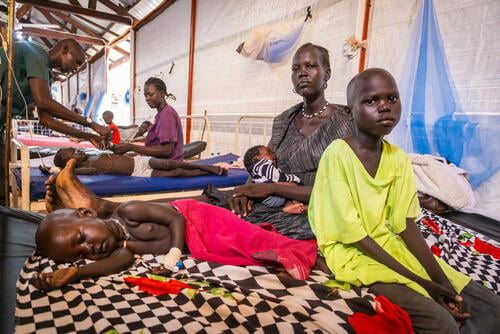
“While efforts have been made to replenish supplies in health clinics in Northern Bahr El-Ghazal over recent weeks, the delays have cost lives and, with the malaria season not yet over, many more children are going to become sick and end up in the hospital unless urgent action is taken to improve people’s access to simple treatment,” Mustapha explains.
“In the past week, we have added even more beds in the hospital to try and reduce congestion in the corridors, and we’ve opened a seventh test and treatment centre that operates 24/7,” says Mustapha. “But far more test and treatment centres are needed in the most at-risk communities so that children can be treated on the spot before their condition deteriorates and hospital treatment becomes the only option that will make it possible to save their lives.”
This year, South Sudan received its first doses of the R21 malaria vaccine, marking a major milestone in the country’s fight against the disease. MSF is supporting the Ministry of Health in the rollout of this vaccine, and we are hopeful that with increased coverage it will make a significant impact in helping to control the disease in the years to come.



